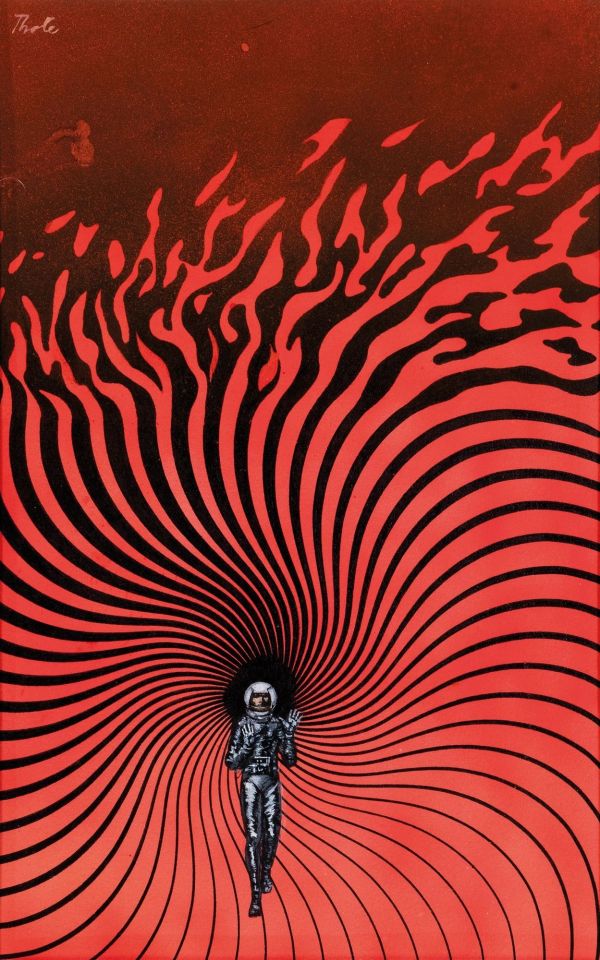Text
‘Run Lola Run’ Will Sprint Back Into Theaters This Summer, Complete with a 4K Restoration
Tom Tykwer's unstoppable Franka Potente-starring thriller will celebrate its 25th anniversary this June.
BY KATE ERBLAND
APRIL 19, 2024
11:30 AM

'Run Lola Run' — Sony Pictures Classics
Looking for a genuinely heart-pounding, inventive blockbuster for your summer movie-watching schedule? Consider something classic: Tom Tykwer’s clever 1999 thriller “Run Lola Run.” In celebration of the film‘s 25th anniversary, Sony Pictures Classics announced Friday that they will reissue the film in theaters on June 7, timed to coincide with the film’s original U.S. release. The anniversary reissue will feature a new DCP from the 4K restoration, “created in collaboration with the filmmakers.”
Written and directed by Tykwer, “Run Lola Run” was a breakout smash hit for both the filmmaker and his star Franka Potente. Per today’s announcement, at the time of its original release, the film was “hailed for its experimental structure, propulsive techno score (composed by Tykwer, Johnny Klimek, Reinhold Heil), and Potente’s fierce performance as the titular, flame-haired heroine.” IndieWire’s review from 1999 hailed its “clever, wholly unique narrative concept” which “instantly makes it one of the more original, unpretentious European films seen on these shores in years.”
Per today’s announcement, the film follows “Lola (Franka Potente) [as she] answers a call from her boyfriend Manni (Moritz Bleibtreu), a small-time courier for a big-time gangster. He has a problem: His boss is coming to pick up 100,000 Deutsche Marks in 20 minutes, and he doesn’t have the money. With Manni’s life on the line, Lola runs through the streets of Berlin to reach him and somehow pick up 100,000 marks along the way, making split-second decisions and encountering acquaintances, family, and strangers. As the clock ticks down, the tiniest choices become life-altering (or life-ending), and the fine line between fate and fortune begins to blur.”
Looking for a genuinely heart-pounding, inventive blockbuster for your summer movie-watching schedule? Consider something classic: Tom Tykwer’s clever 1999 thriller “Run Lola Run.” In celebration of the film‘s 25th anniversary, Sony Pictures Classics announced Friday that they will reissue the film in theaters on June 7, timed to coincide with the film’s original U.S. release. The anniversary reissue will feature a new DCP from the 4K restoration, “created in collaboration with the filmmakers.”
Written and directed by Tykwer, “Run Lola Run” was a breakout smash hit for both the filmmaker and his star Franka Potente. Per today’s announcement, at the time of its original release, the film was “hailed for its experimental structure, propulsive techno score (composed by Tykwer, Johnny Klimek, Reinhold Heil), and Potente’s fierce performance as the titular, flame-haired heroine.” IndieWire’s review from 1999 hailed its “clever, wholly unique narrative concept” which “instantly makes it one of the more original, unpretentious European films seen on these shores in years.”
Per today’s announcement, the film follows “Lola (Franka Potente) [as she] answers a call from her boyfriend Manni (Moritz Bleibtreu), a small-time courier for a big-time gangster. He has a problem: His boss is coming to pick up 100,000 Deutsche Marks in 20 minutes, and he doesn’t have the money. With Manni’s life on the line, Lola runs through the streets of Berlin to reach him and somehow pick up 100,000 marks along the way, making split-second decisions and encountering acquaintances, family, and strangers. As the clock ticks down, the tiniest choices become life-altering (or life-ending), and the fine line between fate and fortune begins to blur.”
The film is told in three variations and memorably features three endings, all of it set to a soundtrack that continues to draw accolades from film buffs and soundtrack fans today. Sony Pictures Classics initially released the film in the U.S., a year after its German release. The film grossed over $7 million dollars in the United States and Canada, becoming one of the highest grossing foreign-language films ever released domestically at that time. It ultimately made $22 million worldwide.
“Run Lola Run” started its, er, run with an enviable festival schedule: it screened at Venice, TIFF, and Sundance (where it won the Audience Award), before picking up seven awards at the German Film Awards and being picked as the German entry for Best Foreign Language film at the 71st Academy Awards (though it did not make the film pack of five nominees).
In an official statement, Sony Pictures Classics brass shared, “Over the past 25 years, ‘Run Lola Run’ remains one of the most enduring Sony Pictures Classics titles of all time. It is as timely now as when it first appeared in theaters in 1999. Our nationwide reissue in June is a celebration of this first hi-tech thriller presented as it deserves, to be seen and reseen on the big screen, and to continue to dazzle new generations of viewers.”
Earlier this year, SPC re-released another one of its beloved classics into theaters: Jean-Pierre Jeunet’s delightful “Amélie.” In the coming months, the distributor will release a pair of new films, including the Dakota Johnson-starring “Daddio” and the Sundance hit “Kneecap.”
0 notes
Text
El cineasta Asghar Farhadi: “el cine hay que hacerlo con el corazón”
El director iraní estuvo presente en el Festival Internacional de Cine de Cartagena de Indias donde aseguró que muchas películas, pese a estar bien logradas técnicamente, “no tienen alma”

Asghar Farhadi en el Festival Internacional de Cine de Cartagena de Indias Especial
EFE EN CARTAGENA
20/04/2024 14:07
El director de cine iraní Asghar Farhadi, ganador de dos premios Oscar y un Globo de Oro, dijo este jueves en el Festival Internacional de Cine de Cartagena de Indias(FICCI) que “las películas hay que hacerlas con el corazón del artista” para que conecten con el público.
Farhadi, uno de los invitados especiales del FICCI, aseguró que muchas películas, pese a estar bien logradas técnicamente, “no tienen alma, no tienen corazón, no tienen sentimientos”.
“Si el realizador de la cinta no hace el filme con el alma entonces no se genera esa conexión con el público que determina que la cinta trascienda o se vaya al olvido”, dijo.
Este cineasta iraní se ha ganado un lugar en el cine mundial porque en sus filmes reflexiona sobre la condición humana para lo cual confía en su sensibilidad para captar situaciones y crear los personajes de sus historias, la mayoría muy relacionadas con la cotidianidad humana.
“Si uno no logra sentir a los personajes como personas, si uno no puede decir que tal personaje le recuerda al hermano o al padre, parece como si hubiera una distancia entre el observador, el personaje y la película”, agregó.
Durante una charla en el Centro de Formación de la Cooperación Española de Cartagena explicó que son las pequeñas decisiones, las que puede parecer que no son relevantes, “las que pueden conllevar a grandes problemas y dificultades en nuestra vida”.
“Así que con base en esta idea yo procuro en casi todas mis películas que la primera complejidad empiece con algo pequeño, una pequeña decisión o una pequeña frase”, apostilló.
En España como en casa
Farhadi (1972) recibió los dos premios de la academia a Mejor Película de Habla no Inglesa por Nader y Simin, una separación (2011) y El Cliente (2016).
Entre su filmografía también está Todos lo saben (2018), A propósito de Elly (2009), Beautiful City (2004), y su ópera prima Dancing in the Dust (2003).
“El objetivo de hacer películas fuera de mi país era permitirme conocer otras culturas y a otras personas de todo el mundo, y una de las culturas que me encanta es la española porque me parece muy rica, muy emotiva”, destacó Farhadi.
Aseguró que en España se siente “como en casa”, pues “los españoles a nivel emocional se parecen mucho a los iraníes; son muy amables, cálidos y familiares”.
En España vivió durante el rodaje de la cinta Todos lo saben (2018), interpretada por Penélope Cruz y Javier Bardem, y pese a que estaba solo se sintió muy bien porque descubrió que “las relaciones interpersonales entre los españoles se parecen mucho a las relaciones de las personas en Irán, que se unen mucho en ese ambiente familiar”.
“Rodar en España fue una muy buena experiencia porque al elenco y al equipo que tenía les importaba mucho que todo saliera bien, realmente me la pasé muy bien allí”, apuntó.
Este cineasta, del que el director artístico del FICCI, el alemán Ansgar Vogt, dice que es un “maestro del desarrollo de personajes que crea empatía con su audiencia”, recordó que una de sus más maravillosas experiencias fue haber trabajado con la pareja de esposos Bardem-Cruz, “ellos realmente se entregaron completamente a la película”.
“Ellos fueron más que mi elenco, se volvieron mi familia, yo estaba solo en España y ellos se acercaron a mí, me apoyaron muchísimo y son unos increíbles profesionales, me encanta trabajar con ellos, seguimos en contacto”, aseguró.
#cine#Director#Asghar Farhadi#Cineasta#Irán#Colombia#Festival Internacional de Cine de Cartagena de Indias#FICCI#new york times
0 notes
Text
Song of Myself (1892 version)
BY WALT WHITMAN
[…]
44
It is time to explain myself—let us stand up.
What is known I strip away,
I launch all men and women forward with me into the Unknown.
The clock indicates the moment—but what does eternity indicate?
We have thus far exhausted trillions of winters and summers,
There are trillions ahead, and trillions ahead of them.
Births have brought us richness and variety,
And other births will bring us richness and variety.
I do not call one greater and one smaller,
That which fills its period and place is equal to any.
Were mankind murderous or jealous upon you, my brother, my sister?
I am sorry for you, they are not murderous or jealous upon me,
All has been gentle with me, I keep no account with lamentation,
(What have I to do with lamentation?)
I am an acme of things accomplish’d, and I an encloser of things to be.
My feet strike an apex of the apices of the stairs,
On every step bunches of ages, and larger bunches between the steps,
All below duly travel’d, and still I mount and mount.
Rise after rise bow the phantoms behind me,
Afar down I see the huge first Nothing, I know I was even there,
I waited unseen and always, and slept through the lethargic mist,
And took my time, and took no hurt from the fetid carbon.
Long I was hugg’d close—long and long.
Immense have been the preparations for me,
Faithful and friendly the arms that have help’d me.
Cycles ferried my cradle, rowing and rowing like cheerful boatmen,
For room to me stars kept aside in their own rings,
They sent influences to look after what was to hold me.
Before I was born out of my mother generations guided me,
My embryo has never been torpid, nothing could overlay it.
For it the nebula cohered to an orb,
The long slow strata piled to rest it on,
Vast vegetables gave it sustenance,
Monstrous sauroids transported it in their mouths and deposited it with care.
All forces have been steadily employ’d to complete and delight me,
Now on this spot I stand with my robust soul.
3 notes
·
View notes
Text
THE ISLAMIC REVOLUTION'S ATTITUDE TO THE ART OF CINEMA was thrown into sharp relief by the arson attack that destroyed Abadan's Cinema Rex on the eve of the uprisings in 1978, killing over 300 viewers. For the Islamic reformers cinema was counter-revolutionary and thus its material embodiment deserved to be destroyed.
— Shiva Rahbaran
0 notes
Text

Eclipse.
2K notes
·
View notes
Text
How a Dream Came True: Young Jane Goodall’s Exuberant Letters and Diary Entries from Africa
BY MARIA POPOVA
When Jane Goodall (b. April 3, 1934) was a little girl, she was given a stuffed toy chimpanzee, whom she named Jubilee. From that moment on, little Jane and Jubilee became inseparable, but she especially enjoyed sitting with him on a tree branch in her family’s backyard, where she would read the Tarzan novels for hours on end. Like most children, Jane transformed the toy and the books into raw material for dreams — in her case, the dream of going to Africa to study the curious lives of monkeys. Unlike most children, she spent the next two decades turning that childhood dream into a reality by becoming the world’s most influential primatologist and the most celebrated woman in science since Marie Curie.
When she boarded the S.S. Kenya Castle one chilly spring day, 22-year-old Goodall was burning with exuberant enthusiasm for the work she was heading to Kenya to do. But she had no idea that this work, at first met with enormous resistance, would revolutionize not only our understanding of chimpanzees — her lifelong locus of curiosity and expertise — but our understanding of the complexities of all animal consciousness.
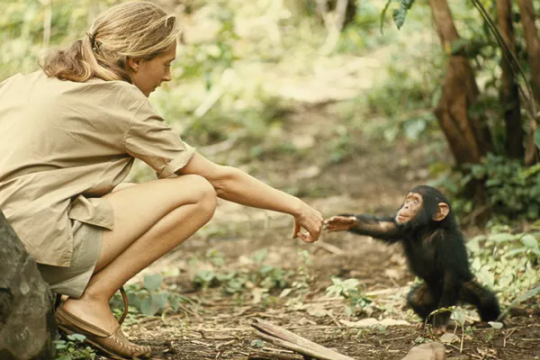
Jane Goodall with the young chimp Flint at Gombe (Photograph: Hugo van Lawick, Goodall’s first husband, courtesy of Jane Goodall Institute)
In a letter to her family penned aboard the Kenya Castle in March of 1957, found in the altogether magnificent Africa in My Blood: An Autobiography in Letters (public library), Goodall writes:
Darling Family,
It is now 4 p.m. on Thursday and I still find it difficult to believe that I am on my way to Africa. That is the thing — AFRICA. It is easy to imagine I am going for a long sea voyage, but not that names like Mombasa, Nairobi, South Kinangop, Nakuru, etc., are going to become reality.
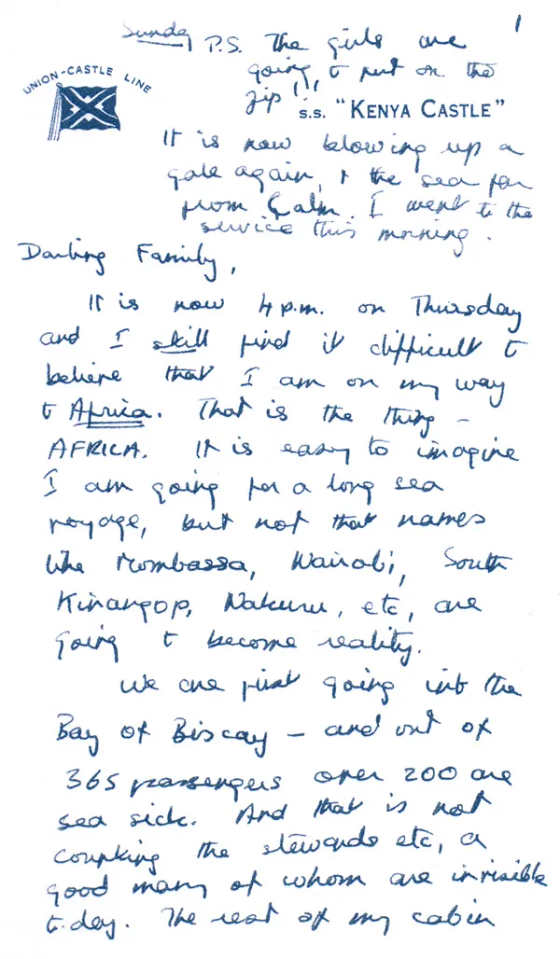
The first page of Goodall’s letter to her family from aboard the Kenya Castle
On April 3 — her twenty-third birthday — Goodall finally arrived in the dreamsome reality of Nairobi. Her first letter home brims with uncontainable gusto for the life she was about to begin — a life she had purposefully pursued since childhood:
I really do simply adore Kenya. It’s so wild, uncultivated, primitive, mad, exciting, unpredictable. It is also slightly degrading in its effect on some rather weak characters, but on the whole I am living in the Africa I have always longed for, always felt stirring in my blood.
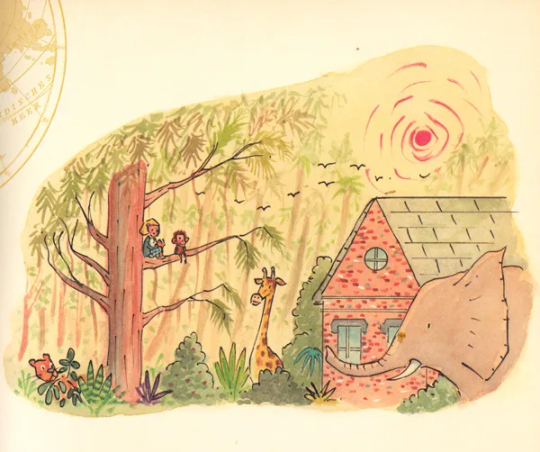
Illustration by from ‘Me … Jane,’ a picture-book about Goodall’s childhood. Click image for more.
But the most fateful date in Goodall’s journey came more than three years later: On July 14, 1960, she arrived in Tanzania’s Gombe Stream National Park, where she would spend many years conducting the groundbreaking research for which she is celebrated today, and to which she still returns frequently in the course of her tireless environmental conservation work.
It was there that she met, named, and befriended the now-famous David Greybeard — the first chimp to overcome the fear of human contact and the generous gatekeeper who made possible Goodall’s research amid the chimpanzee community.
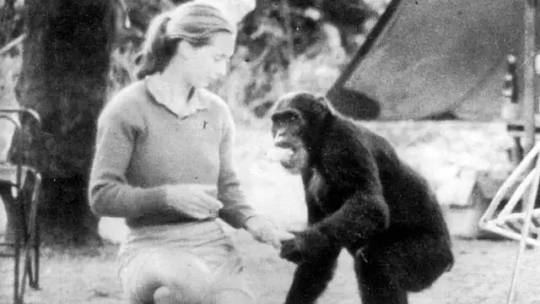
Jane Goodall with David Greybeard at Gombe
On her very first day at Gombe, Goodall saw her first chimp. It was a highly unlikely occurrence — at that point, scientists considered chimpanzees mysterious creatures at once wild and timid, nearly impossible to sight, let alone approach. In a diary entry from that first day, preserved by The Jane Goodall Institute, the young scientist captures the tremendous thrill of that miraculous event — a visceral affirmation that she was indeed living her childhood dream:
We woke at dawn … Left about 9 and arrived about 11. The fisherman were all along the beaches frying their dagga fish. It looked as though patches of sand had been whitewashed. Above, the mountains rose up steeply behind the beaches. The slopes were thickly covered with accacia and other trees… Every so often a stream cascaded down the vallys between the ridges, with its thick fringe of forest — the home of the chimps.
The lake water was so clear I could scarcely believe it.
Our tent was up in no time, in a clearing up from the fisherman’s huts on the stony beach. We had some lunch together, and then Ma and I spent an exhausting and hot afternoon setting things in order. I say exhausting because I had a foul sore throat, turning into a cold.
Then, about 5 o’clock, someone came along to say some people had seen a chimp. So off we went and there was the chimp. It was quite a long way -too far to tell its sex or even see properly what it looked like — but it was a chimp. It moved away as we drew level with the crowd of fishermen gazing at it, and, though we climbed the neighboring slope, we didn’t see it again. However, we went over to the trees & found a fresh nest there. — Whether that day’s of the day before I couldn’t tell. We returned to the beach and walked back.
We all had dinner together, and after long chats, & helplessly endeavoring to hear the news, Ma and I thankfully retired to bed.
Although 26-year-old Goodall was accompanied by her mother at Gombe — a requirement by the park’s chief warden, who was concerned about the young primatologist’s safety, and a reflection of what women scientists had to grapple with in that era — she continued corresponding with her relatives at home. On day three at Gombe, she writes in a picturesque letter to her grandmother Danny and the rest of the family:
We got here, Danny, on your birthday & mentally had tea with you — just after I had seen my first chimpanzee! I could hardly believe I could be lucky enough to see one on my very first day. We were quite far away, but at least close enough to know it was a chimp & not a baboon. There are lots of Baboon here — one Troop comes very close to the tent each morning to watch us. I went out yesterday afternoon to do a little exploring on my own and saw a beautiful bushbuck — a smallish animal, lovely reddish gold colour. He flew away almost from under my feet, barking like a dog.
The country here is quite beautiful, but very rugged. The little stream behind the tent rushes down the steep rock valley, gurgling and splashing down steppes of waterfalls. The water is pure and sweet — doesn’t even have to be boiled. 16 such streams flow down the valleys between the mountain ridges, & along their banks are the forest galleries, the home of the chimps. In between the mountain slopes are fairly bare — really it is ideal country for my job, though at the moment the task seems of a huge magnitude.
We got here, Danny, on your birthday & mentally had tea with you — just after I had seen my first chimpanzee! I could hardly believe I could be lucky enough to see one on my very first day. We were quite far away, but at least close enough to know it was a chimp & not a baboon. There are lots of Baboon here — one Troop comes very close to the tent each morning to watch us. I went out yesterday afternoon to do a little exploring on my own and saw a beautiful bushbuck — a smallish animal, lovely reddish gold colour. He flew away almost from under my feet, barking like a dog.
The country here is quite beautiful, but very rugged. The little stream behind the tent rushes down the steep rock valley, gurgling and splashing down steppes of waterfalls. The water is pure and sweet — doesn’t even have to be boiled. 16 such streams flow down the valleys between the mountain ridges, & along their banks are the forest galleries, the home of the chimps. In between the mountain slopes are fairly bare — really it is ideal country for my job, though at the moment the task seems of a huge magnitude.
To see the passion and perseverance with which Goodall has dedicated her life to the accomplishment of that monumental task is nothing short of breathtaking.
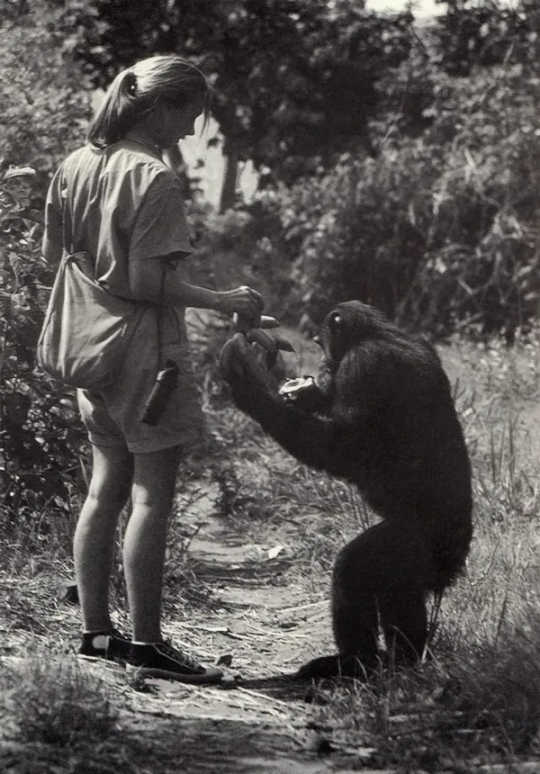
Jane Goodall with David Greybeard at Gombe
Complement the altogether exhilarating Africa in My Blood, a trove of Goodall’s contagious enthusiasm and goodness, with the beloved scientist on empathy and our highest human potential, her answers to the Proust Questionnaire, and a lovely children’s book about her childhood.
0 notes
Text
Song of Myself (1892 version)
BY WALT WHITMAN
[…]
43
I do not despise you priests, all time, the world over,
My faith is the greatest of faiths and the least of faiths,
Enclosing worship ancient and modern and all between ancient and modern,
Believing I shall come again upon the earth after five thousand years,
Waiting responses from oracles, honoring the gods, saluting the sun,
Making a fetich of the first rock or stump, powowing with sticks in the circle of obis,
Helping the llama or brahmin as he trims the lamps of the idols,
Dancing yet through the streets in a phallic procession, rapt and austere in the woods a gymnosophist,
Drinking mead from the skull-cup, to Shastas and Vedas admirant, minding the Koran,
Walking the teokallis, spotted with gore from the stone and knife, beating the serpent-skin drum,
Accepting the Gospels, accepting him that was crucified, knowing assuredly that he is divine,
To the mass kneeling or the puritan’s prayer rising, or sitting patiently in a pew,
Ranting and frothing in my insane crisis, or waiting dead-like till my spirit arouses me,
Looking forth on pavement and land, or outside of pavement and land,
Belonging to the winders of the circuit of circuits.
One of that centripetal and centrifugal gang I turn and talk like a man leaving charges before a journey.
Down-hearted doubters dull and excluded,
Frivolous, sullen, moping, angry, affected, dishearten’d, atheistical,
I know every one of you, I know the sea of torment, doubt, despair and unbelief.
How the flukes splash!
How they contort rapid as lightning, with spasms and spouts of blood!
Be at peace bloody flukes of doubters and sullen mopers,
I take my place among you as much as among any,
The past is the push of you, me, all, precisely the same,
And what is yet untried and afterward is for you, me, all, precisely the same.
I do not know what is untried and afterward,
But I know it will in its turn prove sufficient, and cannot fail.
Each who passes is consider’d, each who stops is consider’d, not a single one can it fail.
It cannot fail the young man who died and was buried,
Nor the young woman who died and was put by his side,
Nor the little child that peep’d in at the door, and then drew back and was never seen again,
Nor the old man who has lived without purpose, and feels it with bitterness worse than gall,
Nor him in the poor house tubercled by rum and the bad disorder,
Nor the numberless slaughter’d and wreck’d, nor the brutish koboo call’d the ordure of humanity,
Nor the sacs merely floating with open mouths for food to slip in,
Nor any thing in the earth, or down in the oldest graves of the earth,
Nor any thing in the myriads of spheres, nor the myriads of myriads that inhabit them,
Nor the present, nor the least wisp that is known.
0 notes
Text
Letters from a Stoic; Seneca's Letter XII, on Old Age

Wherever I turn, I see evidences of my advancing years. I visited lately my country-place, and protested against the money which was spent on the tumble-down building. My bailiff maintained that the flaws were not due to his own carelessness; "he was doing everything possible, but the house was old." And this was the house which grew under my own hands! What has the future in store for me, if stones of my own age are already crumbling? I was angry, and I embraced the first opportunity to vent my spleen in the bailiff's presence. "It is clear," I cried, "that these plane-trees are neglected; they have no leaves. Their branches are so gnarled and shrivelled; the boles are so rough and unkempt! This would not happen, if someone loosened the earth at their feet, and watered them." The bailiff swore by my protecting deity that "he was doing everything possible, and never relaxed his efforts, but those trees were old." Between you and me, I had planted those trees myself, I had seen them in their first leaf. Then I turned to the door and asked: "Who is that broken-down dotard? You have done well to place him at the entrance; for he is outward bound. Where did you get him? What pleasure did it give you to take up for burial some other man's dead?" But the slave said: "Don't you know me, sir? I am Felicio; you used to bring me little images. My father was Philositus the steward, and I am your pet slave." "The man is clean crazy," I remarked. "Has my pet slave become a little boy again? But it is quite possible; his teeth are just dropping out.
I owe it to my country-place that my old age became apparent whithersoever I turned. Let us cherish and love old age; for it is full of pleasure if one knows how to use it. Fruits are most welcome when almost over; youth is most charming at its close; the last drink delights the toper, the glass which souses him and puts the finishing touch on his drunkenness. Each pleasure reserves to the end the greatest delights which it contains. Life is most delightful when it is on the downward slope, but has not yet reached the abrupt decline. And I myself believe that the period which stands, so to speak, on the edge of the roof, possesses pleasures of its own. Or else the very fact of our not wanting pleasures has taken the place of the pleasures themselves. How comforting it is to have tired out one's appetites, and to have done with them! "But," you say, "it is a nuisance to be looking death in the face!" Death, however, should be looked in the face by young and old alike. We are not summoned according to our rating on the censor's list. Moreover, no one is so old that it would be improper for him to hope for another day of existence. And one day, mind you, is a stage on life's journey.
Our span of life is divided into parts; it consists of large circles enclosing smaller. One circle embraces and bounds the rest; it reaches from birth to the last day of existence. The next circle limits the period of our young manhood. The third confines all of childhood in its circumference. Again, there is, in a class by itself, the year; it contains within itself all the divisions of time by the multiplication of which we get the total of life. The month is bounded by a narrower ring. The smallest circle of all is the day; but even a day has its beginning and its ending, its sunrise and its sunset. Hence Heraclitus, whose obscure style gave him his surname, remarked: "One day is equal to every day." Different persons have interpreted the saying in different ways. Some hold that days are equal in number of hours, and this is true; for if by "day" we mean twenty-four hours' time, all days must be equal, inasmuch as the night acquires what the day loses. But others maintain that one day is equal to all days through resemblance, because the very longest space of time possesses no element which cannot be found in a single day, – namely, light and darkness, – and even to eternity day makes these alternations more numerous, not different when it is shorter and different again when it is longer. Hence, every day ought to be regulated as if it closed the series, as if it rounded out and completed our existence.
Pacuvius, who by long occupancy made Syria his own, used to hold a regular burial sacrifice in his own honour, with wine and the usual funeral feasting, and then would have himself carried from the dining-room to his chamber, while eunuchs applauded and sang in Greek to a musical accompaniment: "He has lived his life, he has lived his life!" Thus Pacuvius had himself carried out to burial every day. Let us, however, do from a good motive what he used to do from a debased motive; let us go to our sleep with joy and gladness; let us say: “I have lived; the course which Fortune set for me/Is finished. And if God is pleased to add another day, we should welcome it with glad hearts. That man is happiest, and is secure in his own possession of himself, who can await the morrow without apprehension. When a man has said: "I have lived!", every morning he arises he receives a bonus.”
“But now I ought to close my letter. "What?" you say; "shall it come to me without any little offering? "Be not afraid; it brings something, – nay, more than something, a great deal. For what is more noble than the following saying of which I make this letter the bearer: "It is wrong to live under constraint; but no man is constrained to live under constraint." Of course not. On all sides lie many short and simple paths to freedom; and let us thank God that no man can be kept in life. We may spurn the very constraints that hold us. "Epicurus," you reply, "uttered these words; what are you doing with another's property?" Any truth, I maintain, is my own property. And I shall continue to heap quotations from Epicurus upon you, so that all persons who swear by the words of another, and put a value upon the speaker and not upon the thing spoken, may understand that the best ideas are common property. Farewell.”
— Seneca
Excerpt From "Letters from a Stoic" by Seneca.
This material may be protected by copyright.
1 note
·
View note
Text
instagram
0 notes
Text
instagram
0 notes
Text
Song of Myself (1892 version)
BY WALT WHITMAN
[…]
42
A call in the midst of the crowd,
My own voice, orotund sweeping and final.
Come my children,
Come my boys and girls, my women, household and intimates,
Now the performer launches his nerve, he has pass’d his prelude on the reeds within.
Easily written loose-finger’d chords—I feel the thrum of your climax and close.
My head slues round on my neck,
Music rolls, but not from the organ,
Folks are around me, but they are no household of mine.
Ever the hard unsunk ground,
Ever the eaters and drinkers, ever the upward and downward sun, ever the air and the ceaseless tides,
Ever myself and my neighbors, refreshing, wicked, real,
Ever the old inexplicable query, ever that thorn’d thumb, that breath of itches and thirsts,
Ever the vexer’s hoot! hoot! till we find where the sly one hides and bring him forth,
Ever love, ever the sobbing liquid of life,
Ever the bandage under the chin, ever the trestles of death.
Here and there with dimes on the eyes walking,
To feed the greed of the belly the brains liberally spooning,
Tickets buying, taking, selling, but in to the feast never once going,
Many sweating, ploughing, thrashing, and then the chaff for payment receiving,
A few idly owning, and they the wheat continually claiming.
This is the city and I am one of the citizens,
Whatever interests the rest interests me, politics, wars, markets, newspapers, schools,
The mayor and councils, banks, tariffs, steamships, factories, stocks, stores, real estate and personal estate.
The little plentiful manikins skipping around in collars and tail’d coats,
I am aware who they are, (they are positively not worms or fleas,)
I acknowledge the duplicates of myself, the weakest and shallowest is deathless with me,
What I do and say the same waits for them,
Every thought that flounders in me the same flounders in them.
I know perfectly well my own egotism,
Know my omnivorous lines and must not write any less,
And would fetch you whoever you are flush with myself.
Not words of routine this song of mine,
But abruptly to question, to leap beyond yet nearer bring;
This printed and bound book—but the printer and the printing-office boy?
The well-taken photographs—but your wife or friend close and solid in your arms?
The black ship mail’d with iron, her mighty guns in her turrets—but the pluck of the captain and engineers?
In the houses the dishes and fare and furniture—but the host and hostess, and the look out of their eyes?
The sky up there—yet here or next door, or across the way?
The saints and sages in history—but you yourself?
Sermons, creeds, theology—but the fathomless human brain,
And what is reason? and what is love? and what is life?
0 notes
Text
‘Three Summers’ (‘Três Verões’): Film Review | TIFF 2019
Regina Casé ('The Second Mother') stars in writer-director Sandra Kogut’s new social dramedy 'Three Summers,' which premiered in Toronto.
By Jordan Mintzer
September 7, 2019 @ 5:19Am

COURTESY OF TIFF
A chaotic class dramedy where the help and the helped wind up switching places, Three Summers (Três Verões) marks another occasion for Brazilian actress Regina Casé (The Second Mother) to shine in the role of a housekeeper trying to overcome stiff social barriers and find her own slice of happiness. Set in one location over a trio of Christmas holidays (which, in Brazil, take place during the summer), this cleverly written and staged, if sometimes unruly, new feature from writer-director Sandra Kogut (Campo Grande) could see wider exposure after its world premiere at the Toronto International Film Festival.
Plunging us straight into the action in December of 2015, Kogut introduces us to Madelena, aka Madá (Casé), the maid-in-charge of a sprawling vacation condo belonging to a rich Rio family who settles down there each holiday. Although the long-married couple of Edgar (Otávio Müller) and Marta (Gisele Fróes) own the place, Madá seems to be the real boss, directing the other servants and taking care of Edgar’s father, Lira (Rogério Fróes), who stays in one of the guest rooms.
With Ivo Lopus Araújo’s handheld camera frenetically following Madá as she oversees the family’s Christmas party, we watch the housekeeper boisterously deal with a number of near-disasters while also trying to purchase a tract of land so she can set up her own roadside concession stand. Played infectiously by Casé, Madá is at once quick-lipped, stubborn and eager to please, making the best out of a situation that has her cleaning up everyone’s mess, yet doing it with a sly smile.
Cut to one year later. Rain has ruined the holidays, but that’s not the only thing gone wrong: Edgar and Marta have disappeared, and a little while later the police show up with a warrant to search the house. As it turns out, Madá’s boss has been fingered in a corruption investigation — part of the wide-reaching Operation Car Wash that took Brazil by storm starting in 2014, resulting in billions in seized property and hundreds of arrests, including that of former President Lula de Silva.
And yet again, Madá won’t let this latest catastrophe stop her from getting ahead. She may be without a job or salary, and her boss may be in jail, but she’ll somehow make it work. Soon enough, she and the other servants are popping open champagne, partying by the pool and trying to sell off the owners’ belongings in a yard sale. And Madá won’t even stop at that, eventually turning part of the condo into an Airbnb.
Kogut, who co-wrote the script with Iana Cossoy, displays a keen eye for satirizing Brazil’s rigid class structures and how people like Madá try to find their own piece of the pie within them. Indeed, not only does the housekeeper have a good time with her fellow servants — the behind-the-scenes jocularity is reminiscent of Jean Renoir’s The Rules of the Game — but she has no qualms asking her bosses to fund her new business venture. And when the latter get caught up in the scandal, she turns that to her advantage as well, using their yacht to offer sightseeing tours of confiscated homes.
The film is cleverly structured, asking the viewer to fill in the wide gaps between each narrative ellipsis, as if we’re watching a TV series where half the episodes have been cut out. Sometimes that can be confusing, such as in the third part (set in 2017), which begins with an infomercial shoot taking place in the house and goes on for a little too long. But even that sequence eventually finds meaning when Madá appears before the camera and we dig deep into her past, revealing a dark side behind her cheery façade.
Casé was a famous television star in Brazil before breaking out internationally with Anna Muylaert’s 2015 drama The Second Mother, in which she played a housekeeper trying to reconnect with her estranged daughter. In Three Summers, her performance is much more unhinged, as if Madá were a stand-up comic stuck in the role of a domestic manager, obliged to deal with the Christmas tree decorations and caterers. But looks can be deceiving: Madá may be a servant, but she’s ultimately the one being served.
Production companies: Republica Pureza Filmes, Gloria Films Production
Cast: Regina Casé, Rogério Fróes, Otávio Müller, Gisele Fróes, Carla Ribas, Daniel Rangel, Jessica Ellen
Director: Sandra Kogut
Screenwriters: Sandra Kogut, Iana Cossoy
Producers: Marcello Ludwig Maia, Laurent Lavolé
Executive producer: Marcello Ludwig Maia
Director of photography: Ivo Lopus Araújo
Production designers: Marcos Pedroso, Thales Junqueira
Costume designer: Marina Franco
Editors: Sergio Mekler, Luisa Marques
Casting director: Marcela Altberg
Venue: Toronto International Film Festival (Contemporary World Cinema)
Sales: Urban Distribution International
In Portuguese
94 minutes
#Cinema#Brazil#Brazilian Cinema#Republica Pureza Filmes#Gloria Films Production#Regina Casé#Rogério Fróes#Otávio Müller#Gisele Fróes#Carla Ribas#Daniel Rangel#Jessica Ellen#Sandra Kogut#Iana Cossoy#Marcello Ludwig Maia#Laurent Lavolé#Ivo Lopus Araújo#Marcos Pedroso#Thales Junqueira#Marina Franco#Sergio Mekler#Luisa Marques#Marcela Altberg#oronto International Film Festival#TIFF#Urban Distribution International
0 notes
Text
Jafar Panahi lascia l’Iran dopo 14 anni
28 Aprile 2023
di
Ettore Di Serio
Il cineasta iraniano, in seguito alla scadenza del divieto di viaggiare, ha potuto lasciare il Paese con sua moglie Tahereh Saeedi. La Francia è pronta ad accoglierlo: c’è spazio per Cannes?

Un post recente della sig.ra Panahi, apparso sui social, ha confermato la possibilità del marito di tornare a viaggiare e, pertanto, la rimozione del divieto che bloccava il regista in Iran da ben 14 anni. La destinazione finale di questo viaggio è la Francia, Paese europeo nel quale il regista ritroverà la figlia.
La storia di Panahi, come del resto quella di altri cineasti iraniani, è ben nota e non ha lasciato indifferenti i media internazionali. Sin dai suoi primi lavori, il regista si è distinto per l’acutezza e la creatività. Film come Il palloncino bianco (1995) e Lo specchio (1997) sono stati premiati rispettivamente al Festival di Cannes e al Festival di Locarno. Tuttavia, la consacrazione definitiva è giunta con Il cerchio (2000), che si è aggiudicato il Leone d’Oro al Festival di Venezia.
I primi seri problemi giudiziari sono arrivati nel 2009 quando in Iran si scatenò il Movimento Verde a seguito delle contestate elezioni presidenziali. Il cineasta iraniano, a causa della sua partecipazione al funerale di un ragazzo ucciso durante le proteste, subì il primo divieto di viaggio ufficiale da parte dell’autorità iraniana. La situazione peggiorò l’anno successivo, quando Panahi si vide negata la possibilità di partecipare al Festival di Berlino e subito dopo fu arrestato subendo una condanna di 20 anni relativamente alla possibilità di viaggiare e realizzare film, a causa delle sue critiche al governo.

Il suo ultimo lavoro è Gli orsi non esistono (2022), film drammatico vincitore del premio speciale della giuria al Festival di Venezia. I guai però non abbandonano Panahi e, nell’estate del 2022, in seguito all’arresto di Mohammad Rasoulof, egli con i suoi avvocati si rivolge all’autorità per chiedere spiegazioni in merito ai fatti accaduti. Qui, il regista è trattenuto dalle autorità e sarà rilasciato solo nel febbraio 2023. Ad oggi, dopo la partenza dall’Iran, Jafar Panahi sembra aver ritrovato la tranquillità.
#festival di berlino#festival di cannes#gli orsi non esistono#il cerchio#jafar panahi#mohammad rasoulof#mostra internazionale del cinema di venezia#orso argento#orso d'oro
1 note
·
View note
Text
Letter III — On True and False Friendship — Seneca
You have sent a letter to me through the hand of a "friend" of yours, as you call him. And in your very next sentence you warn me not to discuss with him all the matters that concern you, saying that even you yourself are not accustomed to do this; in other words, you have in the same letter affirmed and denied that he is your friend. Now if you used this word of ours in the popular sense, and called him "friend" in the same way in which we speak of all candidates for election as "honourable gentlemen," and as we greet all men whom we meet casually, if their names slip us for the moment, with the salutation "my dear sir," – so be it. But if you consider any man a friend whom you do not trust as you trust yourself, you are mightily mistaken and you do not sufficiently understand what true friendship means. Indeed, I would have you discuss everything with a friend; but first of all discuss the man himself. When friendship is settled, you must trust; before friendship is formed, you must pass judgment. Those persons indeed put last first and confound their duties, who, violating the rules of Theophrastus, judge a man after they have made him their friend, instead of making him their friend after they have judged him. Ponder for a long time whether you shall admit a given person to your friendship; but when you have decided to admit him, welcome him with all your heart and soul. Speak as boldly with him as with yourself. As to yourself, although you should live in such a way that you trust your own self with nothing which you could not entrust even to your enemy, yet, since certain matters occur which convention keeps secret, you should share with a friend at least all your worries and reflections. Regard him as loyal, and you will make him loyal. Some, for example, fearing to be deceived, have taught men to deceive; by their suspicions they have given their friend the right to do wrong. Why need I keep back any words in the presence of my friend? Why should I not regard myself as alone when in his company?
There is a class of men who communicate, to anyone whom they meet, matters which should be revealed to friends alone, and unload upon the chance listener whatever irks them. Others, again, fear to confide in their closest intimates; and if it were possible, they would not trust even themselves, burying their secrets deep in their hearts. But we should do neither. It is equally faulty to trust everyone and to trust no one. Yet the former fault is, I should say, the more ingenuous, the latter the more safe. In like manner you should rebuke these two kinds of men, – both those who always lack repose, and those who are always in repose. For love of bustle is not industry, – it is only the restlessness of a hunted mind. And true repose does not consist in condemning all motion as merely vexation; that kind of repose is slackness and inertia. Therefore, you should note the following saying, taken from my reading in Pomponius: "Some men shrink into dark corners, to such a degree that they see darkly by day. No, men should combine these tendencies, and he who reposes should act and he who acts should take repose. Discuss the problem with Nature; she will tell you that she has created both day and night. Farewell.
0 notes
